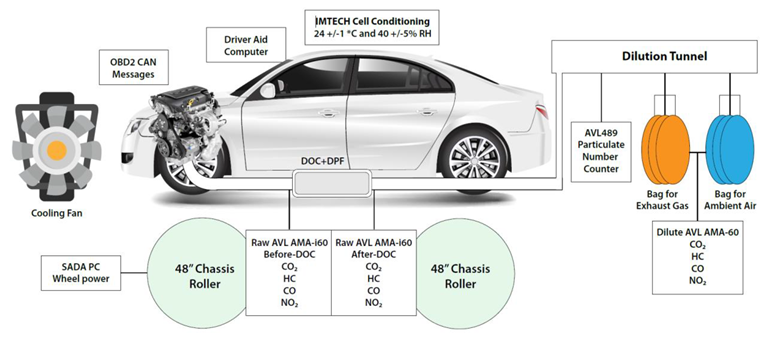Scientists from Australia and Bangladesh have collaborated on a new paper in the journal Energies exploring the environmental and health impacts of biodiesel emissions.

Study: Biodiesel Emissions: A State-of-the-Art Review on Health and Environmental Impacts. Image Credit: Mut Hardman/Shutterstock.com
Biodiesel: A Sustainable Alternative to Petrochemical-based Fuels
Biodiesel is produced from animal fats and plant oils and has been widely proposed and researched as a sustainable alternative to conventional fossil fuel-based diesel, which has been linked to climate change and air pollution. The natural sources used for manufacturing biodiesel are renewable and include crops, tallow, and waste vegetable oils from the food industry.
Technically, biodiesel is classified as mono-alkyl esters of fatty acids and is produced by transesterification processes. Commercial biodiesel is made from waste oils provided by restaurants, food producers, and stores. Agricultural crops are a common source of this alternative, sustainable fuel, but their viability as commercial biodiesel sources is limited by the expense of raw oil.
In addition to the cost of raw materials, biodiesel conversion techniques are currently prohibitive, meaning that biodiesel cannot always compete with fossil fuel-derived diesel. Waste oil is preferred due to its cost-effectiveness but converting these resources into value-added biodiesel is a complex endeavor, as contaminants need to be removed during processing.
Currently, biodiesel use is modest in several jurisdictions across the world, but the potential of this alternative fuel to address both environmental concerns and energy security is becoming more obvious to researchers and multiple actors in industry and the commercial sector. Biodiesel must be of the same quality as conventional fossil fuel-derived diesel to be competitive.
In the not-too-distant future, many researchers believe that biodiesel will become a significant component of national energy infrastructures. An advantage of this fuel is its ability to be combined with existing petroleum-based fuels due to having the same applications as conventional diesel and extremely similar composition.

Biofuel production by region from 2016 to 2021. Image Credit: Aljaafari, A et al., Energies
Biodiesel and Emissions
The composition of biodiesel, however, depends on the source and manufacturing method. Biodiesel typically contains less sulfur but more cetane than conventional low-sulfur diesel. Extensive research has demonstrated that biodiesel reduces wear in fuel systems and helps improve the longevity of these engine components.
Biodiesel is commonly evaluated by researchers in terms of energy efficiency and maintenance benefits. However, there is a lack of current understanding of the health and environmental effects of biodiesel emissions. Diesel emissions are highly complex and undergo various changes due to photochemical reactions and the aggregation of particles into fine particulate air pollution.
Many components in air pollution have been linked to negative health effects in urban populations as well as environmental damage. For example, there is substantial evidence that repeated and long-term exposure to diesel exhaust fumes is carcinogenic and particulate matter is known to cause irritation in the lungs.
Emissions have also been linked to ozone depletion, ecosystem compromise, global warming, and increasingly extreme weather patterns. Currently, the negative effects of biodiesel emissions are largely unknown. Therefore, there is an urgent need for reliable and accurate information on the long-term health and environmental effects of biodiesel use.
The Study
The new paper in Energies has presented a state-of-the-art review on the environmental and health impacts of biodiesel emissions. Knowing these potential impacts will benefit public health and environmental assessments of this alternative fuel as it becomes a more significant component of national energy infrastructures. Current literature does not address this research question adequately.
The review paper investigates the production processes involved in biodiesel synthesis currently and biodiesel composition. The different types of raw resources used, such as food crops, have been considered by the authors, and their environmental impact is discussed in-depth. The health effects of air pollution and particulate matter produced in biodiesel emissions have been highlighted in the study.

Production process of biodiesel. Image Credit: Aljaafari, A et al., Energies
Review Conclusions and Future Perspectives
Sustainable fuels are vitally important for meeting the environmental, social, and economic challenges of the 21st century. The study has made some key conclusions and highlighted some important future research perspectives.
Before biodiesel resources can be made full use of, researchers and industry must gain more insight into the topic. Long-term public health and environmental side effects and technical challenges in biodiesel production must be considered. Currently, data is lacking on the links between biodiesel exposure and negative health effects for populations.
The study has also highlighted some technical perspectives on the composition of biodiesel emissions. Firstly, biodiesel produces more NOx emissions than conventional diesel. Additionally, whilst carbon emissions are less, there is an associated increase in ozone. More research is needed on emissions and their potential impacts to ensure the feasibility of biodiesel as an alternative fuel.

Biodiesel gaseous phase emission. Image Credit: Aljaafari, A et al., Energies
Future perspectives highlighted in the review paper include further research on alternative biodiesel sources, reducing the impact on human health by implementing policies that control fuel emissions and reduce urban transportation pressure, and utilizing technologies such as AI, machine learning, and Big Data in research.
Whilst there are still several technical and policy challenges that must be addressed by industry, governments, and researchers, biodiesel’s benefits for a sustainable and green future are many. Intimate knowledge of the potential impact of emissions will help to inform future development in this field of research and industry.
Further Reading
Aljaafari, A et al. (2022) Biodiesel Emissions: A State-of-the-Art Review on Health and Environmental Impacts Energies 15(18) 6854 [online] mdpi.com. Available at: https://www.mdpi.com/1996-1073/15/18/6854
Disclaimer: The views expressed here are those of the author expressed in their private capacity and do not necessarily represent the views of AZoM.com Limited T/A AZoNetwork the owner and operator of this website. This disclaimer forms part of the Terms and conditions of use of this website.